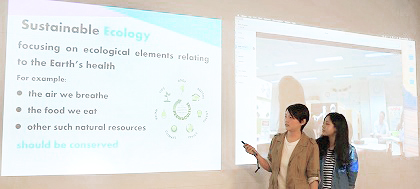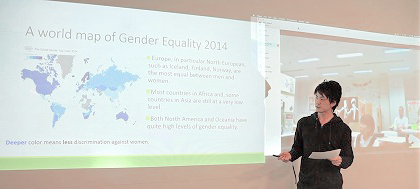Let’s research!【No.3】Virtual English Forum for Ideasでの研究発表
2015年10月19日に、ゼミ生5名がVirtual English Forum for Ideas(→詳しくはこちら)に参加しました。皆さんは、経済学部生ならではの視点から、経済学の専門知識と英語模擬国連の経験を活かし、経済関連のテーマについて、英語で研究発表を行いました。
ここでは、発表内容(一部)を紹介します。
ここでは、発表内容(一部)を紹介します。
Economic Growth and the Protection of Indigenous Culture
(Hirohito Bunnou and Hikaru Nakagawa)
The title of our presentation is “Economic growth and the protection of indigenous culture”. The purpose of our presentation is to give you some information about the links between economic growth and indigenous culture.
Indigenous culture means the culture of indigenous people, who live traditionally in a specific territory from generation to generation. For example, the haka, the ethnic dance of New Zealand’s native Maori people, is a kind of indigenous culture.
The United Nations Declaration on the Rights of Indigenous Peoples was adopted by the United Nations General Assembly on September 13, 2007. It prohibits the discrimination against indigenous people and makes the right of indigenous people clearer. For example, the Declaration protects indigenous people’s right to remain distinct and to pursue their own visions of economic and social development.
Unfortunately, we have seen that indigenous culture was ignored or even destroyed in the process of economic development in the world. We have some ideas of making economic growth and the protection of indigenous culture compatible that we would like to share with you.
We think that culture plays a big role in economic growth. By improving the popularity of indigenous culture, such as promoting the tourism in the region of indigenous people, so-called “indigenous tourism”, people can know more about the culture, and economic growth can also be enhanced at the same time.
We also think that protecting indigenous language is very important when we talk about the protection of indigenous culture. The official language is absolutely necessary in people’s daily lives. However, the language of indigenous people which has been inherited from ancestors might become a dead language. We think that we can use TV programs to preserve indigenous language, since TV programs have a wide range of audience, which is good for letting more people know about indigenous language. For example, in New Zealand, there are TV programs that broadcast in 100% Maori language.
Now there is a movement of protecting indigenous culture in many countries around the world. But, we haven’t seen enough results. Therefore it is necessary to think about the issue not only by the government but also by ourselves. By doing so, we can find out more solutions.
Indigenous culture means the culture of indigenous people, who live traditionally in a specific territory from generation to generation. For example, the haka, the ethnic dance of New Zealand’s native Maori people, is a kind of indigenous culture.
The United Nations Declaration on the Rights of Indigenous Peoples was adopted by the United Nations General Assembly on September 13, 2007. It prohibits the discrimination against indigenous people and makes the right of indigenous people clearer. For example, the Declaration protects indigenous people’s right to remain distinct and to pursue their own visions of economic and social development.
Unfortunately, we have seen that indigenous culture was ignored or even destroyed in the process of economic development in the world. We have some ideas of making economic growth and the protection of indigenous culture compatible that we would like to share with you.
We think that culture plays a big role in economic growth. By improving the popularity of indigenous culture, such as promoting the tourism in the region of indigenous people, so-called “indigenous tourism”, people can know more about the culture, and economic growth can also be enhanced at the same time.
We also think that protecting indigenous language is very important when we talk about the protection of indigenous culture. The official language is absolutely necessary in people’s daily lives. However, the language of indigenous people which has been inherited from ancestors might become a dead language. We think that we can use TV programs to preserve indigenous language, since TV programs have a wide range of audience, which is good for letting more people know about indigenous language. For example, in New Zealand, there are TV programs that broadcast in 100% Maori language.
Now there is a movement of protecting indigenous culture in many countries around the world. But, we haven’t seen enough results. Therefore it is necessary to think about the issue not only by the government but also by ourselves. By doing so, we can find out more solutions.
Sustainable Development
(Zhang Yingyi and Wang Ying)
Today, we are going to tell you something about sustainable development. Why did we choose this theme? Because when we interviewed Mr. Kiyotaka Akasaka at JUEMUN 2015, who was a UN official, he mentioned the importance of sustainable development and that made us be interested in this theme.
In our presentation, first, we will tell you the meaning of sustainable development. After that, we will illustrate the three main parts of sustainable development.
What is sustainable development? According to the UN, sustainable development is development that meets the needs of the present without compromising the ability of future generations to meet their own needs.
Since sustainable development is a very broad concept, here, we categorized it into 3 parts: sustainable ecology, sustainable agriculture, and sustainable energy. They are closely linked to each other and also closely related to our lives.
Sustainable ecology focuses on ecological elements relating to the Earth’s health. Sustainable agriculture means that farmers use nature-friendly ideas to produce crops and vegetables, so that soil, water and air will not be adversely affected by the farming. The third part, sustainable energy, means we should make use of energy resources in a way that does not lead to much pollution and those energy resources can be used for a longer time.
We think the best idea will be to use renewable energy resource as much as we can. Solar energy is commonly used nowadays. This helps us to save other energy to produce electricity.
We also think that recycling waste material is a good idea for sustainable development. Households and companies can help to save the environment by adopting the rule of recycling waste and using the recycled material.
The resources available to us may seem to be many, but in fact they are scarce, not infinite. So, to improve the quality of our life as well as of future generations, we need to think more about sustainable development and take actions.
In our presentation, first, we will tell you the meaning of sustainable development. After that, we will illustrate the three main parts of sustainable development.
What is sustainable development? According to the UN, sustainable development is development that meets the needs of the present without compromising the ability of future generations to meet their own needs.
Since sustainable development is a very broad concept, here, we categorized it into 3 parts: sustainable ecology, sustainable agriculture, and sustainable energy. They are closely linked to each other and also closely related to our lives.
Sustainable ecology focuses on ecological elements relating to the Earth’s health. Sustainable agriculture means that farmers use nature-friendly ideas to produce crops and vegetables, so that soil, water and air will not be adversely affected by the farming. The third part, sustainable energy, means we should make use of energy resources in a way that does not lead to much pollution and those energy resources can be used for a longer time.
We think the best idea will be to use renewable energy resource as much as we can. Solar energy is commonly used nowadays. This helps us to save other energy to produce electricity.
We also think that recycling waste material is a good idea for sustainable development. Households and companies can help to save the environment by adopting the rule of recycling waste and using the recycled material.
The resources available to us may seem to be many, but in fact they are scarce, not infinite. So, to improve the quality of our life as well as of future generations, we need to think more about sustainable development and take actions.
Gender Equality and Women Empowerment
(Hiroaki Fujisawa)
The title of my presentation is Gender Equality and Women Empowerment. I chose this topic because nowadays more and more people started to think about gender equality. I think today is a good opportunity to share my ideas with you.
The United Nations adopted the Convention on the Elimination of All forms of Discrimination against Women in 1979. The convention entered in force in 1981. Now it has spread all over the world, and it has raised many people’s awareness of ending the discrimination against women.
Next let’s see a world map, which shows the gender gap index in the world. Deeper color means less discrimination against women. From the map, we can know which countries have higher equality between men and women. Europe, in particular North European countries, such as Iceland, Finland, Norway, are the most equal. On the contrary, most countries in Africa and also some countries in Asia are still at a very low level. Both North America and Oceania have quite high levels of equality between men and women.
In my opinion, promoting the awareness of gender equality and women empowerment is necessary to make the world better. But emphasizing too much the equality will cause problems too. So, I think we should find a point of compromise or in other words, not too much equality, but also not too less equality. It will be discussed for a long time from now on. This is not somebody’s problem. We need to discuss it more in the society, for example, with other students, faculty advisors, our friends and family members.
The United Nations adopted the Convention on the Elimination of All forms of Discrimination against Women in 1979. The convention entered in force in 1981. Now it has spread all over the world, and it has raised many people’s awareness of ending the discrimination against women.
Next let’s see a world map, which shows the gender gap index in the world. Deeper color means less discrimination against women. From the map, we can know which countries have higher equality between men and women. Europe, in particular North European countries, such as Iceland, Finland, Norway, are the most equal. On the contrary, most countries in Africa and also some countries in Asia are still at a very low level. Both North America and Oceania have quite high levels of equality between men and women.
In my opinion, promoting the awareness of gender equality and women empowerment is necessary to make the world better. But emphasizing too much the equality will cause problems too. So, I think we should find a point of compromise or in other words, not too much equality, but also not too less equality. It will be discussed for a long time from now on. This is not somebody’s problem. We need to discuss it more in the society, for example, with other students, faculty advisors, our friends and family members.









